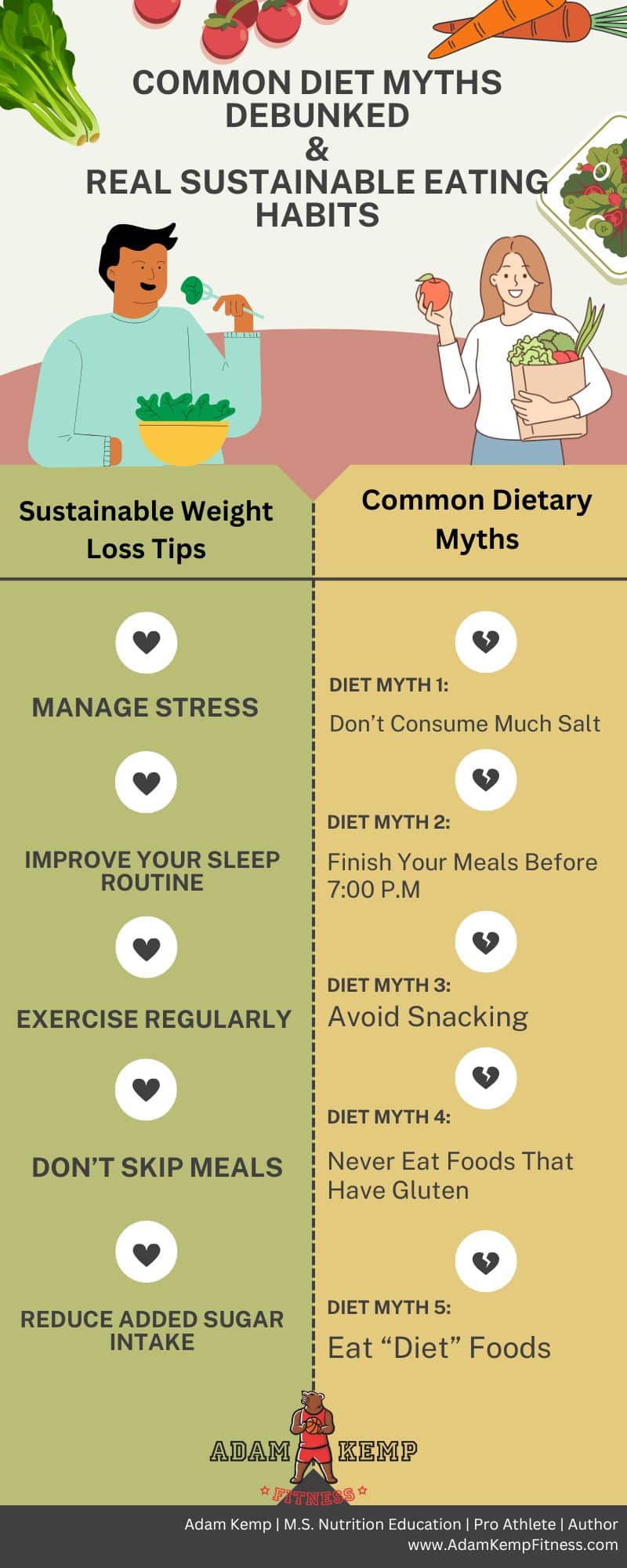Top 10 Healthy Habits for a Happy, Fulfilling Life
The choices we make every day directly influence our overall well-being, from the food we consume to the amount of exercise we get.
Living in a world filled with enticing processed and packaged meals, finding the right nutritional path might seem overwhelming.
However, combining simple yet effective healthy living practices can lead us to a healthier, happier life.
Top 10 Habits for a Healthier Life

Check out these ten essential healthy habits that can greatly enhance your physical and mental health:
1.) Set SMART Goals
Setting SMART goals is a pivotal habit for fostering a healthier lifestyle, primarily due to their structured and realistic approach.
SMART, an acronym for Specific, Measurable, Achievable, Relevant, and Time-bound transforms vague aspirations into clear, attainable objectives.
- Specific: SMART goals demand specificity, eliminating ambiguity and focusing efforts. For instance, rather than aiming to “exercise more,” a SMART goal would be “to walk 30 minutes daily.” This precision aids in structuring activities toward health goals.
- Measurable: By quantifying goals, individuals can track progress, such as counting daily steps or monitoring weight loss weekly. This measurability fosters motivation and a sense of accomplishment upon achieving these milestones.
- Achievable: Setting realistic goals ensures they are within reach, considering one’s current abilities and constraints. Unattainable goals can lead to demotivation, while achievable goals bolster self-efficacy and drive.
- Relevant: Goals should align with personal values and long-term objectives. For instance, if improving cardiovascular health is a priority, setting a goal to jog regularly is relevant. This relevance ensures sustained interest and commitment.
- Time-bound: Establishing a deadline creates a sense of urgency and helps prioritize tasks. Time constraints also allow for regular reassessment and adjustment of goals, ensuring they remain practical and aligned with one’s evolving lifestyle.
Regularly setting and adjusting SMART goals promotes a cycle of continuous improvement and self-awareness in health endeavors.
This approach not only helps achieve specific health outcomes but also fosters a proactive and disciplined mindset, which is crucial for maintaining a healthier lifestyle.
2.) Maintain a Simple, Healthy Diet

The foods we consume play a pivotal role in our overall health, providing essential vitamins and nutrients that our bodies need to function optimally.
In contrast, many of today’s readily available packaged and restaurant meals are often laden with harmful ingredients that can harm our health, including excessive sodium, trans fats, and synthetic flavorings.
Navigating this landscape requires a conscious effort to reduce the intake of processed foods and instead prioritize whole, nutrient-dense options such as fresh fruits, vegetables, and responsibly sourced meats.
By embracing a diet emphasizing whole, natural, and unprocessed ingredients, we can align our eating habits with our health goals and enjoy a richer, more nourishing culinary experience.

3.) Exercise Daily
The benefits of daily physical activity go beyond merely shaping the body. It’s a comprehensive approach to enhancing well-being.
Regular exercise not only fosters increased muscle mass and flexibility but also serves as a catalyst for mental health improvement and heart health enhancement.
To make this a sustainable habit, it’s crucial to incorporate various forms of movement into your routine, such as taking short walking breaks throughout the workday or adding a stretching session to your morning or evening schedule.
By setting realistic goals and approaching this journey with patience and mindfulness, daily exercise can become an enjoyable and integral part of a balanced, healthy life.
4.) Set Healthy Boundaries
The complex interplay between work, relationships, and personal well-being often requires a thoughtful approach to managing one’s energy and time.
Paying attention to where your energy is being expended enables you to identify areas where boundaries may be necessary.
Whether it’s a need to moderate work hours and avoid burnout, recalibrate expectations within relationships, or create space from individuals who contribute negatively to your life, setting clear and healthy boundaries can be an empowering process.
By proactively establishing these limits, you cultivate a sense of control and self-respect, fostering a more harmonious balance between the various facets of your life.
Ultimately, this careful attention to your personal boundaries translates into significant benefits for your mental well-being, laying the foundation for a more fulfilled and resilient life experience.
5.) Stay Hydrated
Proper hydration is an often overlooked but essential aspect of overall health and well-being.
The human body relies on adequate water intake to regulate body temperature, lubricate joints, and bolster the immune system against infections (Popkin et al., 2010).
While many people understand the importance of hydration, it’s not uncommon to fall short of the daily recommended water intake.
To address this, consider implementing strategies such as setting reminders to drink water, using a water-tracking app, or carrying a reusable water bottle.
By consciously prioritizing hydration and recognizing its multifaceted role in supporting vital bodily functions, you can enhance your physical wellness, cognitive performance, and energy levels throughout the day.
6.) Stay On Top of Wellness Checkups
Regular wellness checkups with a healthcare provider are vital in maintaining and optimizing overall health.
These appointments allow for a comprehensive assessment of your physical condition, including routine blood work and screenings tailored to your age, gender, and medical history.
By developing an open dialogue with your healthcare provider, you can discuss existing concerns and proactive measures to enhance your lifestyle and prevent potential health issues.
Annual or biannual checkups, depending on your needs, enable early detection of potential health challenges.
This early intervention often translates to more straightforward and less invasive treatment options.
Furthermore, the personalized guidance received during these visits can support you in making informed decisions about your nutrition, exercise, and other wellness practices.
Emphasizing regular wellness checkups as a central part of your health regimen creates a collaborative approach to care, empowering you to take charge of your well-being with the support of a medical professional.
7.) Develop A Healthy Sleep Routine
Sleep, often considered the cornerstone of overall wellness, is crucial to mental and physical health (Hirshkowitz et al., 2015).
Its benefits extend to cognitive functions, such as memory formation, and contribute to emotional balance and resilience.
Developing a healthy sleep routine starts with consistency.
Going to bed and waking up at the same times each day sets the body’s internal clock, aiding in better sleep quality.
Moreover, cultivating a calming sleep environment—free from disruptive lights, noises, and electronic devices—can significantly enhance your ability to fall asleep and stay asleep.
For those who struggle with sleep, it might be more than just poor habits.
Persistent sleep challenges could signal underlying health issues like sleep apnea or insomnia.
In these cases, professional guidance from a healthcare provider specializing in sleep disorders may be necessary to identify and treat the root cause.
By prioritizing sleep and actively shaping routines to support it, you invest in a foundational aspect of well-being that impacts every area of life.
This commitment to sleep hygiene assures restorative rest and promotes a greater sense of control and vitality in your daily living.
8.) Do Stretching or Mobility Daily
Prioritizing daily stretching and mobility can serve as a holistic approach to improving your physical and mental well-being.
Stretching not only enhances joint flexibility but also promotes better muscular balance and posture, significantly reducing the risk of injuries like strains and sprains (Page, 2012).
9.) Optimize Your Health Through Targeted Supplementation
Supplements can be a potent adjunct to a balanced diet and lifestyle, offering a targeted approach to health optimization and longevity.
While a nutrient-dense diet should always be your primary source of vitamins and minerals, supplementation can fill nutritional gaps or address specific health concerns.
Before embarking on any supplementation regimen, consult a healthcare provider for personalized advice.
Factors such as age, medical history, and lifestyle significantly influence nutrient needs.
A healthcare provider can recommend appropriate tests to ascertain deficiencies and suggest reputable brands known for quality and efficacy.
Given the lack of stringent regulation in this industry, it’s crucial to exercise discernment when selecting supplements.
Look for third-party testing, transparent sourcing, and consult scientific literature to validate the efficacy of the supplements you are considering.
This vigilance ensures you obtain safe and effective supplements aligning with your health goals and complementing other wellness practices.
Intravenous (IV) therapy has emerged as a specialized method for enhancing vitamin intake and hydration levels.
Unlike traditional oral supplements, IV therapy administers vitamins and minerals directly into the bloodstream, ensuring a higher absorption rate and immediate availability to the body’s cells (Gaby, 2002).
The diversity of IV infusions available today allows for personalized treatment, targeting specific health needs such as boosting the immune system, promoting recovery after physical exertion, enhancing hydration, and even addressing aesthetic concerns like signs of aging.
Furthermore, the evolution of medical services has enabled the delivery of IV therapy outside conventional healthcare settings.
Mobile IV therapy providers such as mobile IV therapy in Houston, for example, offer the convenience of administering treatments in the comfort of one’s home, making this innovative approach to wellness more accessible to a broader population.
Whether seeking acute care or preventative health measures, IV therapy represents a flexible and potent tool in the modern health and wellness toolkit.
10.) Eliminate Unhealthy Habits
Engaging in unhealthy habits such as excessive alcohol consumption, smoking, and recreational drug use can lead to a cascade of negative health outcomes.
These behaviors affect your immediate well-being and contribute to long-term health risks, including cardiovascular disease, lung issues, and mental health disorders.
Quitting such habits may require a multifaceted approach, including medical intervention, psychological counseling, and community support.
Depending on the severity and nature of the habit, one may benefit from medications designed to alleviate withdrawal symptoms, behavioral therapies, and support groups that offer accountability and emotional support.
Taking active steps to remove these damaging behaviors from your lifestyle will not only improve your current state of health but can also significantly extend your lifespan and enhance your quality of life.
Addressing these habits head-on is a crucial aspect of a comprehensive health strategy that creates a foundation for achieving and maintaining optimal health.
Final Thoughts: How to Improve Your Health with Positive Habits
Attaining and maintaining good health is a lifelong journey that encompasses a myriad of factors, from dietary choices to physical activity and mental well-being.
Rather than merely extending your lifespan, taking a comprehensive approach to wellness significantly enriches the quality of your life, enhancing both your physical capabilities and emotional resilience (Diener & Chan, 2011).
By adopting small, manageable changes—such as eliminating destructive habits, incorporating daily exercise, and making conscientious food choices—you set the stage for long-term health gains.
These incremental changes are not just isolated improvements but interconnected elements that synergistically contribute to your overall wellness.
Therefore, even small adjustments can generate significant impacts, laying the foundation for a healthier, more fulfilling life.
Read Next: Healthy Habits for Weight Loss



